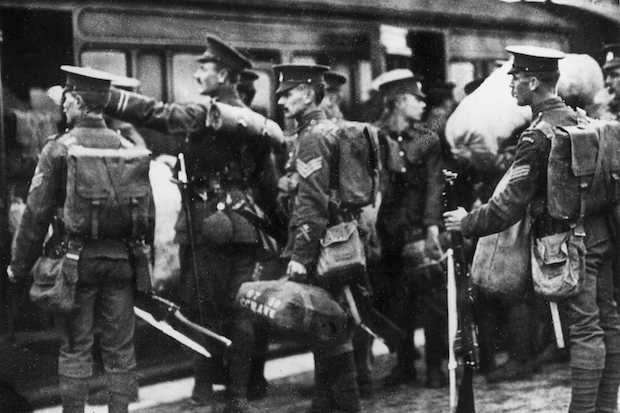From ‘Catching the Train’, The Spectator, 17 July 1915:
ENGLISHMEN have many exasperating habits, but perhaps the most exasperating of all is that of running a train so fine that they only just catch it. What the normal healthy, unnervous Englishman likes to do is to arrive at the railway station one minute before the train starts, walk up the platform a little agitated inside but outwardly very calm and ostentatiously slow in movement, saying to any one he meets that there is not the slightest need to be in a hurry, as there are still twenty-five seconds before she is due to start. “Besides, all the carriage doors are still open and it must take another minute to shut them.” That is the scene at the station end. At the other end the normal Englishman has deliberately dallied with his breakfast and his last bits of packing. Goaded on by the imploring behests of the anxious members of his family if he is the head of it, or the stern rebukes of his elders if he is a cadet, the reminders of the chauffeur that part of the road is up and therefore they cannot go fast, and the final discovery that the hall clock is three minutes slow, he starts with everybody, watch in hand, declaring that it will be little short of a miracle if he does just do it. In spite of that, he generally does do it, having, how- ever, caused the maximum of worry and agitation to everybody, and indeed having made most of the “assistants” declare that he thoroughly deserves to lose his train for being first so casual and then so mulish. Such incidents, which are happening all over the country day by day and almost hour by hour, are a parable of the nation’s present situation. At the moment we are in the period of agitation when everybody is wondering whether the train will be caught. There is just time to do it, but some small accident or delay on the road may quite possibly bring about a catastrophe, so narrow a margin of safety has been left. Belonging as we do to those who like to run no risks, but to look ahead and to have ten minutes to spare at the station before the train starts, we confess to finding the existing position exasperating and humiliating beyond words. Nevertheless, we are bound to confess that it is now fairly well apparent that, in spite of the folly of a late start, a slow clock, and impediments upon the road, we are as a nation going to catch the train, although, in a sense, we so thoroughly deserve to miss it…
If nothing untoward happens to dissipate or destroy the national energies now concentrated on munitions—and there is no reason to suppose that such dissipation or destruction will happen—the situation in another three weeks should be very much improved, and in another six weeks, when, in our opinion, the vital need will have arisen, should be enormously better. We do not moan to say that even then we shall have all we want. We shall, however, have caught the train. It will be a very near run thing, but the national luck, plus our power of hustling at the end, will have prevailed once more to support a thoroughly bad habit. Even if by the latter part of August we are not in a position to lavish shell upon our enemies in the lordly way in which the French lavish it, we shall have quite enough for all practical purposes. From that time onwards the position will steadily improve, and we should not be surprised, provided our rulers and people do not have another fit of somnolence, to find that by the end of the year we are being told by our professional pessi- mists that we have thoroughly overdone it, that wo have got more shell in stock than we can ever use, and that we have made a colossal mistake in not having turned our attention to the “lesser hand grenades Mark DM 1,000,000,” instead of bothering about such antiquated things as artillery projectiles. Our readers must not suppose from what we have written that, if by any chance a great German” push” should after all be managed before the end of August, say in a fortnight rather than six weeks, we should practically be with- out resources. That is a pure delusion. We should certainly not be in a comfortable position if this were to happen, but even at the worst we have now got quite enough of the essential munitions of war held in reserve to prevent a catastrophe of the kind which has been in the public mind during the last month. It is possible that if six weeks ago the Germans had been in a situation, which of course they were not, to press us very hard, we should have missed the train. We have now, however, reached that point on the road where the experienced train-catcher knows that ho can feel fairly confident. We are going to catch the train, though we thoroughly deserve to lose it.






Comments